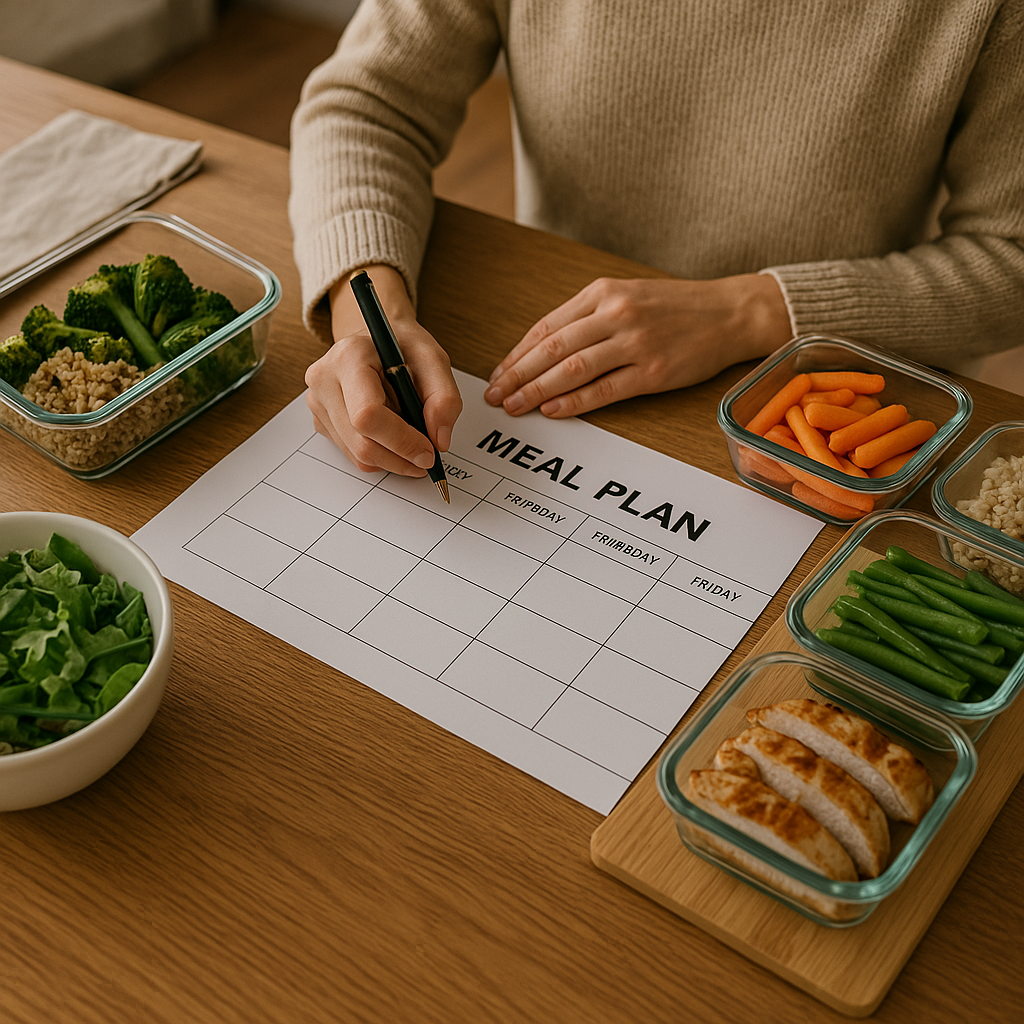When life gets busy, food is often the first thing we compromise. Fast meals, skipped breakfasts, last-minute snacks, and takeout become the norm. But with a little planning, you can organize your weekly meals and avoid those unhealthy choices that leave you feeling tired, bloated, or guilty.
Meal planning isn’t just for nutrition enthusiasts or fitness pros—it’s for anyone who wants to eat better, save time, and reduce stress.
Let’s explore how to do it step by step.
1. Understand the Benefits of Meal Planning
Meal planning isn’t just about food—it’s about creating ease and control in your daily routine.
Here’s what weekly meal planning helps with:
- Avoiding impulsive food decisions
- Saving money by reducing food waste and eating out less
- Saving time throughout the week
- Ensuring a more balanced and nutritious diet
- Reducing stress around “what should I eat?”
Once you experience these benefits, planning your meals will feel like an act of self-care.
2. Choose a Weekly Planning Day
Set aside 30–60 minutes each week to plan your meals. Many people prefer Sundays or Fridays, but the best day is one that fits your schedule.
During your planning time, do the following:
- Check your calendar to see busy vs. open days
- Consider how many meals you’ll need (lunches, dinners, snacks)
- Choose recipes that match your energy and time levels for the week
Tip: Keep a list of “go-to meals” you love for easier planning.
3. Build a Simple, Balanced Menu
You don’t need to plan gourmet dishes for every meal. Keep it simple, varied, and nutritious. Aim to include:
- Proteins: chicken, fish, tofu, eggs, legumes
- Carbs: brown rice, quinoa, whole grain bread, sweet potatoes
- Fats: olive oil, nuts, avocado
- Vegetables: dark leafy greens, colorful veggies, cruciferous types
- Fruits: for snacks, breakfasts, or natural dessert
Example weekly dinner rotation:
- Monday: Grilled chicken with quinoa and broccoli
- Tuesday: Veggie stir-fry with tofu and rice
- Wednesday: Whole grain pasta with tomato sauce and salad
- Thursday: Baked salmon with sweet potato and green beans
- Friday: Homemade veggie pizza
- Saturday: Leftovers or something fun
- Sunday: Lentil soup and salad
Don’t forget: plan some snacks! Fruit, nuts, hummus with veggies, or yogurt are great options.
4. Make a Smart Grocery List
Based on your weekly menu, create a shopping list that helps you buy exactly what you need—no more, no less.
Organize your list by categories:
- Produce
- Proteins
- Grains and carbs
- Dairy or dairy alternatives
- Frozen items
- Pantry staples (spices, oils, canned goods)
Having a list helps you stay on track and avoid last-minute unhealthy purchases.
5. Prep in Batches (Even If Just a Little)
You don’t have to cook all your meals on Sunday. But prepping just a few things in advance can save hours during the week.
Try batch-prepping:
- A pot of rice or quinoa
- Roasted veggies
- Washed and chopped salad greens
- Cooked proteins like grilled chicken or lentils
- Overnight oats or smoothie packs
Even 1–2 prepped ingredients can reduce decision fatigue during busy days.
6. Keep Healthy Options Visible and Easy to Grab
When hunger strikes, you’re more likely to eat what’s convenient.
- Keep fresh fruit on the counter
- Store cut veggies in clear containers
- Portion snacks ahead of time
- Place healthy choices at eye level in the fridge
Visibility + accessibility = smarter choices.
7. Plan for Flexibility, Not Perfection
Sometimes, life doesn’t go as planned—and that’s okay.
Meal planning is not about rigid rules. It’s about having a framework to make better choices most of the time. So, plan with room to shift.
Tips:
- Leave 1–2 “free” meals for unexpected changes
- Keep frozen meals or healthy takeout options as backup
- If you miss a planned meal, just pick up where you left off
A flexible plan is more sustainable than a perfect one.
8. Reflect Weekly and Adjust
At the end of each week, ask yourself:
- What meals did I enjoy the most?
- What felt like too much work?
- Did I waste any food?
- How can I simplify next week’s plan?
This short reflection keeps meal planning effective and tailored to your lifestyle.
Eat Better Without the Stress
Planning your meals doesn’t have to be complicated. With a little structure, you can eat healthier, feel better, and avoid the daily stress of “what’s for dinner?”
Start small:
- Pick 2–3 meals to plan this week
- Write a short grocery list
- Prep just one thing in advance
Each step you take builds confidence and creates a routine that supports your health, time, and peace of mind.
